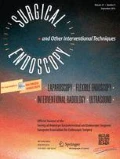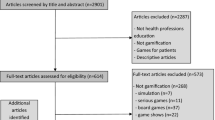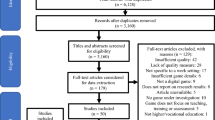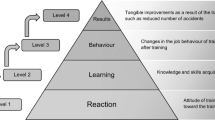Abstract
Background
Video game experience (VGE) has been identified as a possible predictive factor for surgical skill. We hypothesized that surgical novices with previous VGE would acquire new surgical skills faster than those without.
Methods
Fourth-year medical students (M4) and first-year surgical residents (PG-1) completed a survey asking about standard demographic data and previous VGE. Gamers had high VGE, defined as more than 3 h per week of videogame playing. Nongamers had little or no VGE. Both groups trained to proficiency on two tasks (AcquirePlace and Traversal) of the MIST-VR simulator, with proficiency defined as meeting previously validated criteria on two consecutive trials. The number of trials required to achieve proficiency for each task was recorded.
Results
The 26 participants included 11 M4s and 15 PG-1s: 17 males (8 gamers/9 nongamers) and 9 females (3 gamers/6 nongamers), mean age 27.8 years. There were no differences in time to proficiency between the M4 and PG-1 residents, and there were no significant differences in the relative number of gamers per gender. All participants eventually met proficiency criteria. The 11 gamers reached proficiency more quickly than the 15 nongamers (median 0 trials versus 6 trials, p = 0.01). Gamers scored lower than nongamers on their initial attempts. Women overall took longer to reach proficiency than did men (median 10 trials versus 0 trials, p = 0.002). When stratified according to VGE, female nongamers took longer to reach proficiency than male nongamers (median 11 trials versus 1 trial, p = 0.006) but among gamers, there was no difference between females and males (median 0 trials versus 0.5 trials, NS).
Conclusion
Previous VGE shortens time to achieve proficiency on two tasks on a validated surgical simulator. The possibility that VGE may ameliorate gender differences in length of time required to acquire surgical skills should be explored further.
Similar content being viewed by others
References
Entertainment Software Association. Essential facts about the computer and video game industry. 2006. http://www.theesa.com/archives/files/Essential%20Facts%202006.pdf
Grantcharov TP, Bardram L, Funch-Jensen P, Rosenberg J (2003) Impact of hand dominance, gender, and experience with computer games on performance in virtual reality laparoscopy. Surg Endosc 17:1082–1085
Enochsson L, Isaksson B, Tour R, et al. (2004) Visuospatial skills and computer game experience influence the performance of virtual endoscopy. J Gastrointest Surg 8:874–880
Rosser JC, Lynch PJ, Haskamp LA, et al. Are videogame players better at laparoscopic surgical tasks? http://www.psychology.iastate.edu/FACULTY/dgentile/MMVRC_Jan_20_MediaVersion.pdf
Ritter EM, McClusky DA, Smith CD, et al. (2003) Objective psychomotor skills assessment of experienced and novice flexible endoscopists with a virtual reality simulator. J Gastrointest Surg 7:871–878
Van Sickle KR, Ritter EM, Smith CD, et al. (2007) Attempted establishment of proficiency levels for laparoscopic performance on a national scale using simulation: the results from the 2004 SAGES Minimally Invasive Surgical Trainer-Virtual Reality (MIST-VR) learning center study. Surg Endosc 21:5–10
Green SG, Bavelier D (2003) Action video game modifies visual selective attention. Nature 423:534–537
Castel AD, Pratt J, Drummond E (2005) The effects of action video game experience on the time course of inhibition of return and the efficiency of visual search. Acta Psychologica 119:217–230
Seymour NE, Gallagher AG, Satava RM, et al. (2002) Virtual reality training improves operating room performance: Results of a randomized, double-blinded study. Ann Surg 236:458–464
Author information
Authors and Affiliations
Corresponding author
Rights and permissions
About this article
Cite this article
Shane, M.D., Pettitt, B.J., Morgenthal, C.B. et al. Should surgical novices trade their retractors for joysticks? Videogame experience decreases the time needed to acquire surgical skills. Surg Endosc 22, 1294–1297 (2008). https://doi.org/10.1007/s00464-007-9614-0
Received:
Revised:
Accepted:
Published:
Issue Date:
DOI: https://doi.org/10.1007/s00464-007-9614-0




